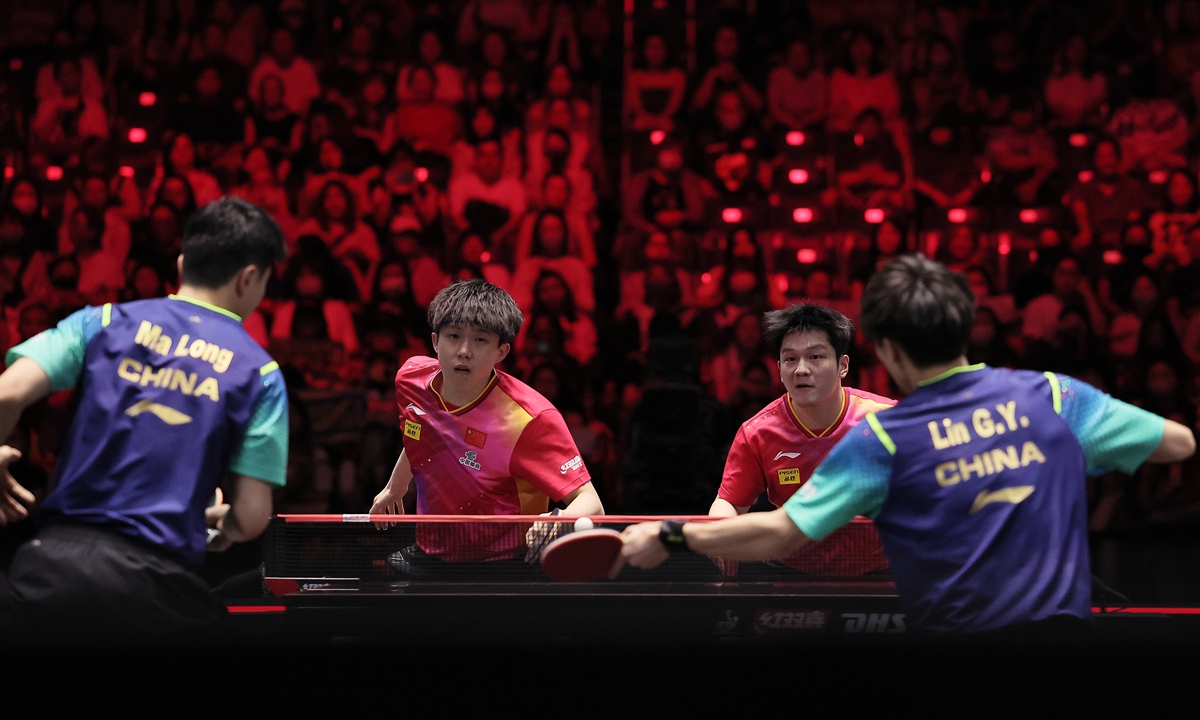
China's Ma Long (left) and Lin Gaoyuan (right) play against compatriots Wang Chuqin (second from left) and Fan Zhendong in the men's doubles final of the World Table Tennis Singapore Smash 2024 in Singapore, on March 16, 2024. Photo: VCG
As China's sports industry continues to thrive, an increasing number of sports and athletes are gaining significant attention and admiration. However, a troubling phenomenon has emerged: fan culture, a subculture originating from the entertainment industry and driven by idol economics, has begun to invade the sports domain, leading to irrational and disruptive behavior.
Recently, domestic media voiced their concern on the issue, as the Paris Olympics is just 40 days away. The General Administration of Sport of China (GAS) in May also declared its firm stance against the encroachment of distorted fan culture in sports, emphasizing the detrimental effects of this culture on the mental and physical well-being of athletes, the national team's performance, and the sustainable development of sports.
The message is clear: sports must not become a breeding ground for the unhealthy aspects of fan culture.
The disruptive behavior associated with fan culture is becoming increasingly prevalent. From online fan wars and comment manipulation to offline star-chasing and aggressive confrontations, the extreme actions of some fans are severely impacting athletes' training, competitions, and daily lives.
A recent incident at the World Table Tennis (WTT) Championships in Chongqing earlier in June highlighted the issue. Fans disrupted matches with banners and chants, delaying serves and engaging in conflicts over the use of camera flashes. This kind of disruption is particularly prevalent in table tennis, where fan conflicts often escalate both inside and outside arenas.
The polarization within fan communities is stark. It has made some dedicated table tennis fans feel alienated by the stringent requirements to join fan groups, which often demand "unwavering loyalty" to a single athlete, a path that fuels the divide between different fan groups, exacerbating tensions.
Some veteran sports enthusiasts like Zhang Wei now prefer to distinguish himself as a "sports enthusiast" rather than a so-called "fan," highlighting the contrast between genuine sports supporters and fanatical followers who focus more on the athletes' personal lives than their athletic prowess.
He said he once wanted to blend in with a fan club to learn more about his favorite athlete but was urged to prove his "undivided allegiance" to the athlete, which made him feel sick.
"It's extremely uncomfortable to do such thing though I actually follow the athlete," Zhang told the Global Times, who asked the athlete's name not be mentioned.
"I think such fan organizations only sideline the broader support of the national team."
Sports professionals also criticize this distorted love for its negative impact on the spirit of sports.
A sports industry insider based in Beijing who declined to be named argues that true fans should support the entire team rather than indulging in divisive and obsessive behaviors.
"The intense focus on individual athletes often leads to online and offline conflicts, detracting from the collective pride in national achievements," he said.
The toxic environment created by extreme fans is not limited to table tennis but extends to other sports like diving, swimming, volleyball and short track speed skating.
Lin Xiaojun, a four-time world champion in short track since representing China in 2021, has voiced his concerns last week over the invasion of privacy by fans in an interview with the Titan Sports newspaper.
Athletes are increasingly finding themselves at the mercy of fan groups' demands, which can interfere with their professional relationships and mental health.
It's crucial to strike a balance between passionate support and rational fandom. Fans should celebrate athletes' achievements without succumbing to divisive and aggressive behaviors. After all, the essence of sports lies in unity, respect, and fair play - not in the chaotic and often damaging actions driven by distorted fan culture.
The author is a reporter with the Global Times. [email protected](责任编辑:休闲)
